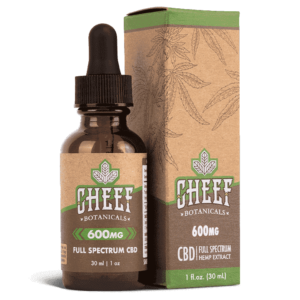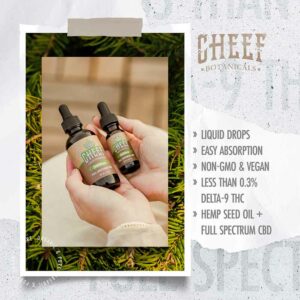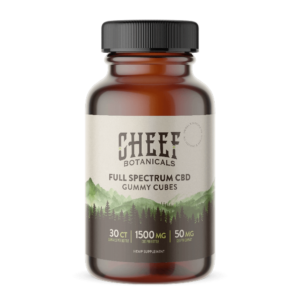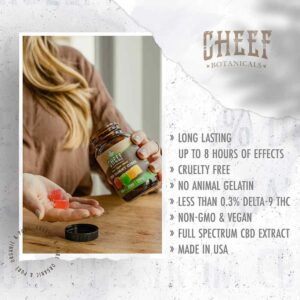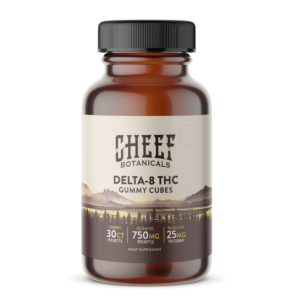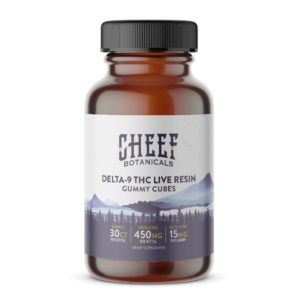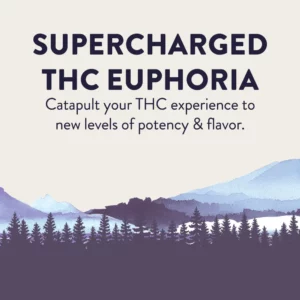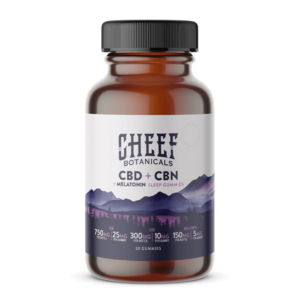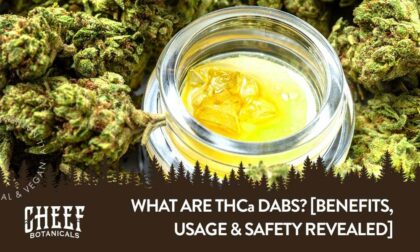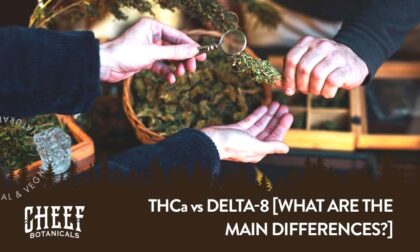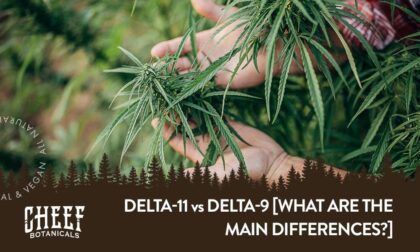Posts
CBD Facts
- Affordable CBD Oil: Highly Effective & Cost Efficient
- All About How To Use CBD For Hangovers [Highly Effective]
- Best Way to Take CBD Oil: How to Maximize the Effects of Cannabidiol
- Broad Spectrum CBD: All The Benefits Of CBD Minus The THC
- Can Federal Employees Use CBD Oil? [Legalities Explained]
- Can Truck Drivers Use CBD? [Yes! But There Are Some Catches]
- Can You be Allergic to CBD Oil? [Read Before Use]
- Can You Build a Tolerance to CBD?
- Can You Fly With CBD Oil? [Preparation Tips]
- Can You Get CBD Withdrawal? Exposing CBD Withdrawal Symptoms
- Can You Overdose On CBD?
- Can You Put CBD Vape Oil Under Your Tongue? No, Here’s Why!
- Can You Smoke CBD Oil? [Smoking CBD]
- Can You Take CBD Oil and Xanax Together? Their Interactions Explained
- Cannabinoid Receptors [How They Work to Help CBD Do Its Thing]
- Cannabis: Marijuana vs Hemp – Do You Know the Difference?
- Cannagars, CBD Cigars & CBD Blunts: Rolling With the Best Hemp
- CBD & Alcohol: Interactions & Safe Practices
- CBD 101: The In-Depth Guide With Everything You Need To Know
- CBD And Driving: Is It Safe & Is It Legal?
- CBD and Terpenes [Why They’re Important]
- CBD Bioavailability & Why It Should Matter to You
- CBD Cigarettes Near Me [Local Merchants & Guide to Online Shopping]
- CBD Oil Near Me [Guide To Local & Online Shopping]
- CBD Oil vs CBD Gummies: Effects & Dosage Explained for Beginners
- CBD To THC Ratio: Finding the Best Cannabinoid Levels
- CBD Vape Shops Near Me: How To Find The Best Vape Stores For You
- CBD vs CBN: Benefits and Uses of CBD and CBN
- CBD vs Kratom [A Thorough Examination]
- CBD vs THC for Sleep: Which Cannabinoid Works Best for More Rest?
- CBD With THC [How They Work Together When You Mix Them]
- CBDa vs CBD [Similarities + Differences EXPLAINED]
- CO2 Extracted CBD Oil: The Cleanest CBD Oil Available
- Do Male Hemp Plants Produce CBD? [How Much?]
- Do Terpenes Get You High? [No, Learn Their Benefits Here]
- Does CBD Counteract THC? [Interactions Explained]
- Does CBD Flower Show Up on a Drug Test? [All You Need to Know]
- Does CBD Get You High? No, But What About The Other Ingredients?
- Does CBD Make You Last Longer? [The Answer May Surprise You]
- Does CBD Oil Affect Blood Work?
- Does CBD Oil Go Bad? [4 Tips On Extending Shelf Life]
- Does CBD Oil Have THC? Sometimes It Can, This is Why!
- Does CBD Oil Need to Be Refrigerated? [Preservation Tips]
- Does CBD Oil Smell Like Weed? – How Strong Does It Smell?
- Does Hemp Get You High? [Full Guide for Smoking, Vaping, Consumption]
- Does Insurance Cover CBD Oil? No, Here Are the Top Reasons Why
- Does the Military Test for CBD?
- Edibles vs Smoking – How Are They Different?
- Fake CBD Oil & CBD Scams [What to Look For]
- History of CBD: How Cannabidiol Became What It Is Today
- How Does the Body Absorb CBD? [4 Different Ways]
- How Long Does CBD Stay in Your System?
- How Long Does It Take For CBD Oil to Work?
- How Long Does Sealed CBD Flower Last? [A Quick Guide]
- How Many Pounds of Hemp Does it Take to Make CBD?
- How Much CBD To Relax? Advice On Proper Dosage For Maximum Chill
- How Much THC Is in CBD Flower? A Must Read Before Buying Hemp
- How Much THC Is in CBD Oil? How To Identify CBD & THC Ratios
- How Old Do You Have To Be To Buy CBD Gummies?
- How Old Do You Have to Be to Buy CBD? [Rules Explained]
- How to Calculate CBD Content Fast! [A Simple Explanation]
- How to Choose CBD Oil Products
- How to Flavor CBD Oil: Simple Ways Make CBD Oil Taste Better
- How To Identify Hemp Plants [Marijuana VS Hemp]
- How To Microdose CBD: Gaining the Most With a Small Dose
- How to Store CBD Gummies [Keep Them Fresh & Flavorful!]
- How to Use CBD Oil [Benefits & Methods for the Best Experience]
- How to Use CBD Tincture the Right Way: 4 Easy Methods
- Is CBD Flower Legal? [Yes, Here’s What You Should Know]
- Is CBD Oil Addictive? No, It’s Not! Here Are the Reasons Why
- Is My CBD Oil Not Working? [How You Can Tell]
- Low THC Strains – The Perfect THC/CBD Ratio for You
- Maintaining Homeostasis in the Human Body [Can CBD Have an Impact?]
- PCR Hemp Oil: What is it? Everything You Need to Know
- Red Eyes From CBD? Highly Unlikely – Here’s Why!
- Sativa Vs Indica Vs Hybrid: The Ultimate CBD Strain Guide for Beginner’s
- Should I Take CBD With THC or Without it? [Pros & Cons]
- Smokable CBD: The Most Effective Ways To Inhale CBD
- Taking CBD for Brain Fog [Better Mental Clarity?]
- Terpenes and Their Effects: How They Improve Each Strain
- The Complete List of Cannabinoids in Cannabis
- The Different Types of CBD & CBD Products [Complete Guide]
- The Endocannabinoid System & CBD [How It Works]
- The Science of Nano CBD – Does Smaller Equal Stronger?
- What Are Cannabinoids? An Up-to-Date & In-Depth Look
- What Are The Side Effects of CBD Oil [FULL TRUTH]
- What CBD Strength Is Right for You? It All Depends on These Factors!
- What Happens if You Take Too Much CBD? Side Effects EXPLAINED
- What is a Tolerance Break and Can CBD Help?
- What Is CBD Oral Spray? [Your Guide to Quick, Portable Wellness]
- What is RSO? A Brief History and Guide
- What is the Best Carrier Oil for CBD?
- What is the Best Time of Day to Take CBD Oil?
- What is the Best Way to Take CBD? [Maximize the Effectiveness]
- What To Look For in CBD Oil [And What to Avoid]
- Whats The Difference Between Hemp Oil And CBD Oil
- When is the Best Time to Meditate? Improve Your Meditation Sessions
- Why I Use Full Spectrum CBD Oil vs. Isolate or Broad Spectrum CBD
- Why Is CBD So Expensive? The Full Breakdown of Cannabidiol Production
- Why Use CBD Oil For Allergies [Has Been Proven To Work!]
So, CBD has got everyone talking these days. What do you know about this new craze? If you answer “close to nothing,” you’re actually in the majority! And there is no need to worry; we’re not here to judge you. On the contrary, we’re here to educate you and fill you in on some CBD facts so you can be in the know!
Cannabidiol, more commonly known as CBD, is a naturally occurring compound in the cannabis plant. Only over the last couple of years has it become popular in the media, but it was discovered far before THC in 1940. These days, CBD has made its way into almost every product you can imagine!
Whether you want to try out CBD or you’re just a curious individual, we’re here to oblige your quest for information. Follow along as we do a deep dive into everything you need to know, from what CBD does, how it can help your body, and nitty-gritty industry details. Let’s explore!
What is CBD?
CBD fact #1! Cannabidiol, more commonly known as CBD, is a compound found in the Cannabis sativa plant. CBD is a naturally occurring substance used in products like oils, capsules, vapes, and edibles to give the consumer a feeling of calm and relaxation. Unlike its cousin, tetrahydrocannabinol (or THC for short), which is the primary active ingredient in marijuana, CBD is non-psychoactive and will not get you high.
What Are the Effects of CBD?
The benefits of cannabidiol (CBD) continue to make waves in the world of wellness and medicine. With more scientists, doctors, and consumers experiencing the various benefits of CBD products, it is only a matter of time before CBD becomes a mainstream solution to daily ailments. Below we’ve listed just a few of CBDs’ most positive effects.
Soothes Nervous Feelings
CBD can help curb those nervous tics and thoughts that are always running amok in your mind. When you take CBD, you’ll feel subtle feelings of calm that take you away from the stress of daily living. Studies show that CBD may affect your brain’s serotonin receptors. Serotonin helps regulate social behavior and mood.
Relieves Soreness
CBD can help reduce aches by reducing tension and swelling in problem areas. Research is currently underway to determine the extent to which CBD can help with joint swelling and other mobility issues.
Boosts Skin Radiance
Recent research suggests that CBD oil can potentially be used to treat skin blemishes. This is thanks to its ability to calm inflammation and reduce sebum production, preventing acne and healing scars.
Stimulates Appetite & Eases Digestion
CBD is also helpful for those who might have trouble filling up their plates. Since CBD can ease queasiness and other stomach discomforts, it may make consumers more willing to eat. Plus, it naturally balances your appetite, making healthy food more tempting!
Promotes Natural Sleep
If you’re a restless night owl that can’t get decent shut-eye, CBD may save the day (or night!). CBD can be deeply relaxing when taken at the appropriate dose. Its ability to dull physical discomfort and ease racing can help send you into that uninterrupted sleep you’ve been craving.
Is CBD Legal?
To answer plainly, yes! CBD fact #2: The 2018 Farm Bill made CBD federally legal. Each state may have different age restrictions when it comes to purchasing CBD, but the compound is legal nationwide. Currently, people can obtain CBD products online without a medical cannabis license. The government’s position on CBD generally depends on whether the CBD comes from hemp or marijuana.
Hemp is federally legal, while marijuana is still illegal. While CBD can be extracted from both marijuana and hemp, only hemp-derived CBD is federally legal. This is because hemp doesn’t contain more than 0.3% THC. This standard keeps hemp-derived CBD products non-psychoactive, meaning they can’t get you high.
Can You Fly Domestically in the US with Hemp-Derived CBD?
While hemp-derived CBD products are entirely legal as of 2018, individual states and cities still retain the right to enforce stricter laws surrounding CBD.
In rare cases, local law enforcement units have arrested and charged individuals flying with CBD products. Any marijuana-derived CBD products with more than 0.3% THC are not legal to fly with, regardless of whether the flight is domestic or international.

Is CBD Oil the Same as Hemp Oil?
CBD fact #3: CBD oil and hemp oil are NOT the same thing. CBD (Cannabidiol) oil is extracted from the cannabis plant. It is usually combined with a base oil such as olive, MCT, or coconut oil. It contains CBD and supplies all those wondrous calming properties that people can’t get enough of!
On the other hand, hemp oil is extracted from hemp seeds and typically doesn’t contain CBD or any other cannabinoids. But, hemp oil is rich in protein and omega fatty acids, so it is healthy in its own right! These nutrients support skin, heart, and immune health.
Does CBD Oil Have THC?
Some formulas do, some don’t. As briefly mentioned above, to legally be categorized as hemp, a cannabis plant cannot contain more than 0.3% THC, dry-weight, when harvested. So while CBD oil does not contain enough THC to make you feel intoxicated, it may contain some THC.
You can choose to buy CBD oil with or without THC. Full spectrum CBD oil will contain trace amounts of THC (0.3% or less), while broad spectrum oil will be THC-free. Both formulas still contain all the terpenes and flavonoids that give the hemp plant its distinct aroma and flavor.
If you’re not interested in anything but CBD, you can purchase Cheef Botanicals Hemp-Derived CBD isolates that contain no THC, other cannabinoids, or terpenes. These are pure CBD molecules in powder form. Though isolate tends to produce the slightest effects, they are flavorless, which makes them fun to mix into food and drinks!
RELATED: Should I Take CBD With THC or Without it? [Pros & Cons]
Is CBD Psychoactive?
Nope! CBD fact #4: CBD is not psychoactive. This means that taking CBD products will not get you high. Tetrahydrocannabinol (THC) is the primary psychoactive ingredient in marijuana, but THC is only one of the many various cannabinoids produced by the cannabis plant. Some CBD products may contain tiny amounts of THC, but it should not be enough to intoxicate you.
Is CBD Safe?
Yes! CBD fact #5: The majority of consumers tolerate CBD with no issue. Rest assured that CBD is very well-tested, with limited side effects that typically fade over time with repeated use.
What Are the Side effects of CBD?
Although it’s typically well-tolerated, CBD may potentially cause some side effects.
- Dry mouth
- Nausea
- Drowsiness
- Diarrhea
- Reduced Appetite
CBD can also affect the levels of some medications in your blood. If you take prescriptions, it’s always good to consult your doctor and ask about any potential interactions.
Is CBD Safe for Animals?
Absolutely. CBD fact #6: Pets can take CBD! One rapidly expanding market for CBD is products for our little furry friends. According to a World Health Organization report made in 2017, CBD seems to be generally well-tested and well-tolerated by animals.
Animal Parents love their pets as if they were their own children (sometimes more than their own children), and nobody wants to see their pets in pain. It seems that more and more folks are willing to venture outside of traditional medicine to help their four-legged family. CBD retailers are well aware of this fact and have taken to creatively marketing various CBD products specifically for pets!
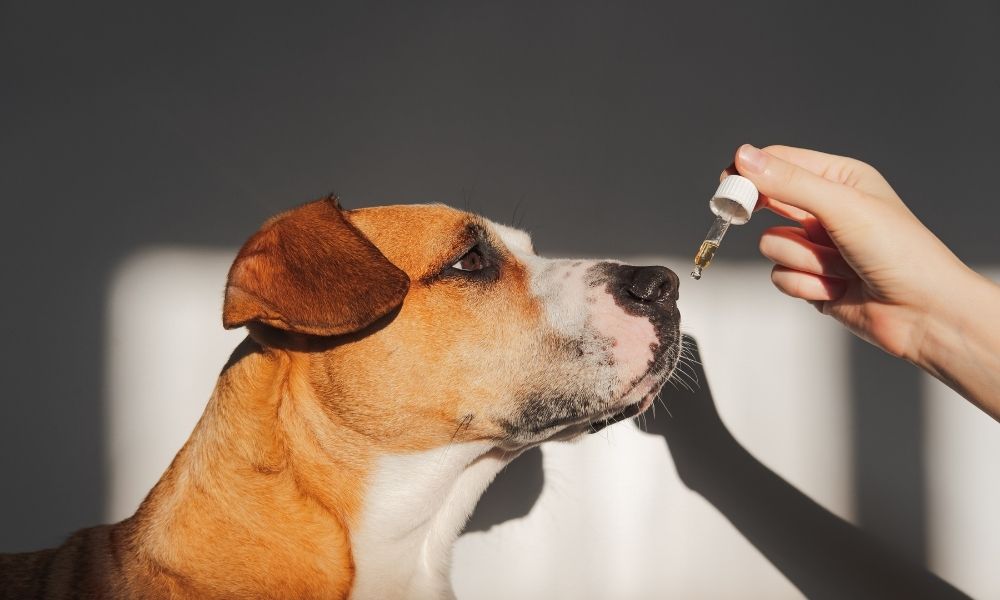
Broad Spectrum, Full Spectrum & Isolate
If you want to take CBD, you might want to consider what kind of extract to buy. Though all CBD products will provide calming effects, certain CBD extracts may be more preferable for some consumers.
But what kind of CBD should you get started with? New CBD consumers should take note that not all CBD products are created equal. If you have been researching CBD, there is a good chance that you’ve encountered the three following CBD types:
Broad Spectrum CBD
In the simplest of terms: when you purchase broad-spectrum CBD products, you’re not getting CBD on its own. Broad-spectrum CBD contains a portion of the additional compounds found in the cannabis plant (including cannabinoids, terpenes, and flavonoids).
Since there is no THC in broad-spectrum CBD products, they are the preferred choice for people who undergo regular drug tests. You’ll still experience an entourage effect when you take broad spectrum products since they include terpenes and other hemp compounds.
Full Spectrum CBD
Full-spectrum CBD products contain the full cannabinoid profile in hemp (the name makes more sense now, doesn’t it?). A full-spectrum CBD product will include terpenes, flavonoids, cannabinol, and all the other cannabinoids (including THC).
Full-spectrum CBD products also typically contain up to 0.3% THC. This trace amount is not enough to make you high, but it does enhance the effects of the CBD.
CBD Isolate
CBD isolates are a form of cannabidiol that has been stripped of all other hemp compounds, resulting in pure CBD molecules. Isolates contain no THC, terpenes, or anything else. It’s just pure, powdered CBD!
Are All CBD Products the Same?
Certainly not. CBD fact #7: Cannabidiol products are as diverse as the population they’re made for! You’ll find an array of products for several purposes. There are various methods of application and different types of CBD extract.
Those without much experience shopping for CBD products may have trouble determining how to find a quality product or even where to start. All CBD consumers should be wary of products labeled as “hemp oil” or “hemp seed oil,” which typically do not contain any CBD at all.
As the FDA begins to crack down on CBD oil labels and develop stricter regulations concerning certificates of analysis, consumers should continue to be on the lookout for the following on any CBD oil label:
- Amount of active CBD per serving (or at LEAST total amount of CBD)
- Manufacturer or distributor name
- Suggested dosage
- Supplement Fact Panel, including other ingredients
- Net weight
- Distinction as full-spectrum, broad-spectrum, or isolate
- Date or Batch code containing a link to that batch’s laboratory results.
- If the product wasn’t lab tested, we suggest that you simply don’t buy it.
What is CBD Commonly Used For?
People use CBD for several reasons. Mood, physical discomfort, appetite, and sleep are the most common. Since CBD can provide systemic balancing effects, it can bring positive effects to just about every system of the body. People even put it on their skin to soothe minor irritations and! The applications are vast and ever-expanding.
Final Thoughts – CBD Facts
So, did you get your CBD facts straight? To get to the truth about CBD, it’s essential to understand the fine details of where it comes from and how the industry markets it. This can save you time, energy, and tears when it comes to shopping for the right product. Some bad-faith actors within the industry create products that mislead unaware CBD consumers, so it’s best to be informed.
CBD can have many wonderful uses and has the potential to significantly improve the consumer’s quality of life. Despite this, proper research must be conducted to ensure your safety and a pleasant CBD experience.

